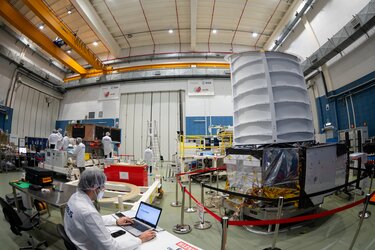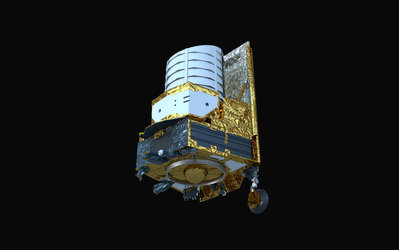Accept all cookies Accept only essential cookies See our Cookie Notice

About ESA
The European Space Agency (ESA) is Europe’s gateway to space. Its mission is to shape the development of Europe’s space capability and ensure that investment in space continues to deliver benefits to the citizens of Europe and the world.
Highlights
ESA - United space in Europe
This is ESA ESA facts Member States & Cooperating States Funding Director General Top management For Member State Delegations European vision European Space Policy ESA & EU Space Councils Responsibility & Sustainability Annual Report Calendar of meetings Corporate newsEstablishments & sites
ESA Headquarters ESA ESTEC ESA ESOC ESA ESRIN ESA EAC ESA ESAC Europe's Spaceport ESA ESEC ESA ECSAT Brussels Office Washington OfficeWorking with ESA
Business with ESA ESA Commercialisation Gateway Law at ESA Careers Cyber resilience at ESA IT at ESA Newsroom Partnerships Merchandising Licence Education Open Space Innovation Platform Integrity and Reporting Administrative Tribunal Health and SafetyMore about ESA
History ESA Historical Archives Exhibitions Publications Art & Culture ESA Merchandise Kids Diversity ESA Brand CentreLatest
Space in Member States
Find out more about space activities in our 23 Member States, and understand how ESA works together with their national agencies, institutions and organisations.
Science & Exploration
Exploring our Solar System and unlocking the secrets of the Universe
Go to topicAstronauts
Missions
Juice Euclid Webb Solar Orbiter BepiColombo Gaia ExoMars Cheops Exoplanet missions More missionsActivities
International Space Station Orion service module Gateway Concordia Caves & Pangaea BenefitsLatest
Space Safety
Protecting life and infrastructure on Earth and in orbit
Go to topicAsteroids
Asteroids and Planetary Defence Asteroid danger explained Flyeye telescope: asteroid detection Hera mission: asteroid deflection Near-Earth Object Coordination CentreSpace junk
About space debris Space debris by the numbers Space Environment Report In space refuelling, refurbishing and removingSafety from space
Clean Space ecodesign Zero Debris Technologies Space for Earth Supporting Sustainable DevelopmentLatest
Applications
Using space to benefit citizens and meet future challenges on Earth
Go to topicObserving the Earth
Observing the Earth Future EO Copernicus Meteorology Space for our climate Satellite missionsCommercialisation
ESA Commercialisation Gateway Open Space Innovation Platform Business Incubation ESA Space SolutionsLatest
Enabling & Support
Making space accessible and developing the technologies for the future
Go to topicBuilding missions
Space Engineering and Technology Test centre Laboratories Concurrent Design Facility Preparing for the future Shaping the Future Discovery and Preparation Advanced Concepts TeamSpace transportation
Space Transportation Ariane Vega Space Rider Future space transportation Boost! Europe's Spaceport Launches from Europe's Spaceport from 2012Latest

The Universe across space and time
Thank you for liking
You have already liked this page, you can only like it once!
One of the scientific goals of ESA’s Euclid mission is to chart the expansion history of the Universe. Recent cosmological observations showed that the Universe does not expand at a constant rate; rather, the Universe's expansion is accelerating. Before these observations, scientists thought that all forms of matter and energy in the Universe would only cause the expansion to slow down over time. To explain an accelerating expansion scientists had to introduce a new form of energy. One working hypothesis for this entity is the ‘cosmological constant’ suggested by Albert Einstein in 1917: a constant energy field present across the entire Universe. It is an intrinsic property of the vacuum of space, so the larger the volume of space, the more ‘vacuum energy’ (dark energy) is present and the greater its effects.
There are alternative suggestions. For example, the acceleration could be produced by a fifth fundamental force of nature that evolves with the expansion of the Universe. Contrary to the cosmological constant, this ‘quintessence’ is dynamic, time-dependent and not evenly distributed across space.
Each explanation for what dark energy is subtly alters the way the acceleration changes across cosmic time.
ESA’s Euclid observations will allow scientists to measure how the rate of expansion of the Universe has changed over time and map the last 10 billion years of cosmic history: from cosmic ‘noon’, the time when most stars were forming, until today. This 'looking back in time' will show us the variations in the cosmic acceleration with extreme precision, helping scientists pin down the nature of dark energy.
Euclid is a European mission, built and operated by ESA, with contributions from NASA. The Euclid Consortium is responsible for providing the scientific instruments and scientific data analysis. ESA selected Thales Alenia Space as prime contractor for the construction of the satellite and its service module, with Airbus Defence and Space chosen to develop the payload module, including the telescope. NASA provided the detectors of the Near-Infrared Spectrometer and Photometer, NISP. Euclid is a medium-class mission in ESA’s Cosmic Vision Programme.
-
CREDIT
ESA -
ACKNOWLEDGEMENTS
ATG Europe -
LICENCE
CC BY-SA 3.0 IGO or ESA Standard Licence
(content can be used under either licence)

Euclid meets Falcon 9 adaptor

Euclid science: five mysteries Euclid will help solve

Euclid in Turin, Italy

Euclid















 Germany
Germany
 Austria
Austria
 Belgium
Belgium
 Denmark
Denmark
 Spain
Spain
 Estonia
Estonia
 Finland
Finland
 France
France
 Greece
Greece
 Hungary
Hungary
 Ireland
Ireland
 Italy
Italy
 Luxembourg
Luxembourg
 Norway
Norway
 The Netherlands
The Netherlands
 Poland
Poland
 Portugal
Portugal
 Czechia
Czechia
 Romania
Romania
 United Kingdom
United Kingdom
 Slovenia
Slovenia
 Sweden
Sweden
 Switzerland
Switzerland























